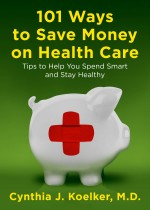Doctors get a kick out of Dr. Gregory House.

- Image via Wikipedia
Why? He has the luxury of telling it like it is. He also has a whole team of fellow physicians to do damage control.
And though he’s a mean old bugger (and certainly not likely to save a dollar on health care) he does point out this important fact: medical care would be much easier – and cheaper – if the truth were always known.
Fostering a good doctor-patient relationship is part of the key to saving money on every aspect of health care. The good news is, a large part of the answer is in your control. Doctors enjoy Dr. House because he thinks like a doctor – sort of. If you think like a doctor yourself, you’ll be ahead of the game.
When I wrote my book, 101 Ways to Save Money on Health Care, I started with the doctor-patient relationship. The entire first chapter is devoted to saving money on doctor visits by understanding your doctor and the billing system. Everyone wants to get more bang for their buck. We like it when our auto mechanic throws in a free car wash – but he’s not likely to do so if you always complain about his service. It’s nice when the butcher adds a free bone for your pooch, but why would he do so if you spend half an hour picking out a single, perfect steak? Doctors are people, too, and are more likely to go the extra mile for you if you are nice, honest, considerate, and responsible.
That doesn’t mean doctors shouldn’t do their best to help you. But it’s the extra things that are often the difference in saving money on health care. Should your doctor call you in a prescription when you habitually show up late for your appointments? Should she help you find the most affordable medications if you can’t be bothered to take them? Should he fill out forms for free inhalers when you refuse to quit smoking?
Some people approach a doctor’s visit llike getting a flat tire repaired: just fix me up and let me out of here. That works, as long as you have a minor problem, on a par with a flat tire or sore throat. But if you’re one of the millions of patients who need a physician’s services for a chronic condition, the relationship becomes increasingly important.
Common areas where increased honesty would save money on health care include diabetes, hypertension, asthma, STDs, obesity, alcoholism, and a host of others. It does no good to say you take your medication when you do not. Why say you can breathe fine when you can’t? When there’s alcohol on your breath, it’s foolish to deny that you drink. I know people are embarrassed, and worry about what their doctor will think. But if you want to save money on health care, just state the facts as they are so you and your doctor can get on with finding an answer.
And if you find your doctor is no better at relationships than Dr. House is, look for a new one.

- Image via Wikipedia
© Cynthia J Koelker, MD – All rights reserved
http://www.101waystosavemoneyonhealthcare.com/
Related articles by Zemanta
- Medical Bargaineering: 7 Tips to Save Money on Medical Expenses (bargaineering.com)
- Medicine Without Doctors (smartmoney.com)


